| Listing 1 - 10 of 12 | << page >> |
Sort by
|
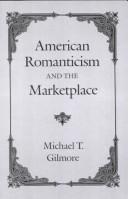
ISBN: 0226293955 Year: 1985 Publisher: Chicago, Ill.
Abstract | Keywords | Export | Availability | Bookmark
 Loading...
Loading...Choose an application
- Reference Manager
- EndNote
- RefWorks (Direct export to RefWorks)
Sociology of literature --- American literature --- anno 1800-1899 --- Romanticism --- Authors and readers --- Authors, American --- Littérature américaine --- Romantisme --- Ecrivains et lecteurs --- Ecrivains américains --- History and criticism --- Biography --- Histoire et critique --- Biographies --- Littérature américaine --- Ecrivains américains
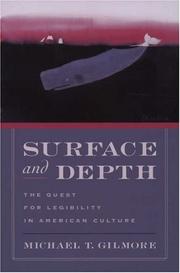
ISBN: 0195157761 0199787786 0195313240 1280502770 9786610502776 160256941X 019803587X 0190289066 Year: 2003 Publisher: Oxford Oxford University Press
Abstract | Keywords | Export | Availability | Bookmark
 Loading...
Loading...Choose an application
- Reference Manager
- EndNote
- RefWorks (Direct export to RefWorks)
The idea of a common American culture has been in retreat for a generation or more. Arguments emphasizing difference have discredited the grand synthetic studies that marginalized groups and perspectives at odds with the master narrative. Surface and Depth: The Quest for Legibility in American Culture is a fresh attempt to revitalize an interpretive overview. It seeks to recuperate a central tradition while simultaneously recognizing how much that tradition has occluded. The book focuses on the American zeal for knowing or making accessible. This compulsion has a long history stretching back to Puritan anti-monasticism; to the organization of the landscape into clearly delineated gridwork sections; and to the creation of a national government predicted on popular vigilance. It can be observed in the unmatched American receptivity to the motion pictures and to psychoanalysis: the first a technology of visual surfaces, the second a technique for plumbing interior depths. Popular literature, especially the Western and the detective story, has reinscribed the cult of legibility. Each genre features a plot that drives through impediments to transparent resolution. Elite literature has adopted a more contradictory stance. The landmarks of the American canon typically embark on journeys of discovery while simultaneously renouncing the possibility of full disclosure (as in Ahab's doomed pursuit of the "inscrutable" white whale). The notorious modernism of American literature, its precocious attraction to obscurity and multiple meaning, evolved as an effort to block the intrusions of a hegemonic cultural dynamic. The American passion for knowability has been prolific of casualties. Acts of making visible have always entailed the erasure and invisibility of racial minorities. American society has also routinely trespassed on customary areas of reserve. A nation intolerant of the hidden paradoxically pioneered the legal concept of privacy, but it did so in reaction to its o
Sociology of literature --- Fiction --- American literature --- American national characteristics in literature --- Amerikaans volkskarakter in de literatuur --- Caractéristiques nationales américaines dans la littérature --- National characteristics [American ] in literature --- Problèmes sociaux dans la littérature --- Social problems in literature --- Sociale problemen in de literatuur --- Volkskarakter [Amerikaans ] in de literatuur --- Wharton, Edith Newbold, 1862-1937. Summer --- American fiction --- American prose literature --- Literature and society --- National characteristics, American, in literature. --- Social problems in literature. --- History and criticism. --- United States --- Civilization. --- In literature. --- National characteristics, American, in literature --- History and criticism --- In literature --- Civilization --- Melville, Herman --- Thoreau, Henry David --- Hawthorne, Nathaniel --- Fitzgerald, Francis Scott --- Poe, Edgar Allan --- Criticism and interpretation --- Fern, Fanny --- Cooper, James Fenimore
Book
ISBN: 0135860571 0135860326 Year: 1977 Publisher: Englewood Cliffs, NJ : Prentice-Hall,
Abstract | Keywords | Export | Availability | Bookmark
 Loading...
Loading...Choose an application
- Reference Manager
- EndNote
- RefWorks (Direct export to RefWorks)
Book
ISBN: 1282710702 9786612710704 0226294153 9780226294155 9780226294131 0226294137 9781282710702 Year: 2010 Publisher: Chicago University of Chicago Press
Abstract | Keywords | Export | Availability | Bookmark
 Loading...
Loading...Choose an application
- Reference Manager
- EndNote
- RefWorks (Direct export to RefWorks)
How did slavery and race impact American literature in the nineteenth century? In this ambitious book, Michael T. Gilmore argues that they were the carriers of linguistic restriction, and writers from Frederick Douglass to Stephen Crane wrestled with the demands for silence and circumspection that accompanied the antebellum fear of disunion and the postwar reconciliation between the North and South. Proposing a radical new interpretation of nineteenth-century American literature, The War on Words examines struggles over permissible and impermissible utterance in works ranging from Thoreau's "Civil Disobedience" to Henry James's The Bostonians. Combining historical knowledge with groundbreaking readings of some of the classic texts of the American past, The War on Words places Lincoln's Cooper Union address in the same constellation as Margaret Fuller's feminism and Thomas Dixon's defense of lynching. Arguing that slavery and race exerted coercive pressure on freedom of expression, Gilmore offers here a transformative study that alters our understanding of nineteenth-century literary culture and its fraught engagement with the right to speak.
American literature --- Slavery in literature. --- Race in literature. --- Literary style --- Slavery and slaves in literature --- Slaves in literature --- Literature --- Style, Literary --- Language and languages --- Rhetoric --- History and criticism. --- Social aspects --- Style --- 19th century --- History and criticism --- 20th century --- Slavery in literature --- Race in literature --- Style [Literary ] --- United States --- Emerson, Ralph Waldo --- Criticism and interpretation --- Thoreau, Henry David --- Fuller, Margaret --- Hawthorne, Nathaniel --- Stowe, Harriet Elizabeth Beecher --- Douglass, Frederick --- Whitman, Walt --- Melville, Herman --- Tourgee, Albion Winegar --- James, Henry --- Twain, Mark --- Crane, Stephen --- Chesnutt, Charles Waddell --- Dixon, Thomas --- Enslaved persons in literature --- slavery, race, literature, frederick douglass, stephen crane, silence, antebellum, disunion, america, reconciliation, utterance, henry james, thoreau, civil disobedience, bostonians, freedom, expression, rhetoric, speaking, voice, lynching, thomas dixon, speech, feminism, margaret fuller, cooper union, lincoln, hawthorne, dissent, whitman, melville, stowe, twain, chestnutt, racism, indian question, jackson, tourgee, bartleby, billy budd, politics, history.
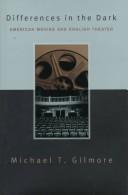
ISBN: 0231112246 Year: 1998 Publisher: New York (N.Y.) : Columbia university press,
Abstract | Keywords | Export | Availability | Bookmark
 Loading...
Loading...Choose an application
- Reference Manager
- EndNote
- RefWorks (Direct export to RefWorks)
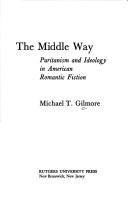
ISBN: 0813508371 Year: 1977 Publisher: New Brunswick, N.J. : Rutgers University Press,
Abstract | Keywords | Export | Availability | Bookmark
 Loading...
Loading...Choose an application
- Reference Manager
- EndNote
- RefWorks (Direct export to RefWorks)
American fiction --- Puritans --- Roman américain --- History and criticism --- Doctrines --- History --- Histoire et critique --- New England --- Intellectual life
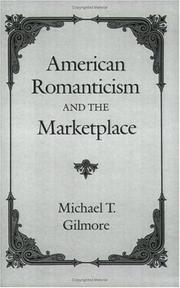
ISBN: 0226293963 9780226293967 Year: 1988 Publisher: Chicago University of Chicago press
Abstract | Keywords | Export | Availability | Bookmark
 Loading...
Loading...Choose an application
- Reference Manager
- EndNote
- RefWorks (Direct export to RefWorks)
Book
Year: 1980 Publisher: Englewood Cliffs Prentice-Hall
Abstract | Keywords | Export | Availability | Bookmark
 Loading...
Loading...Choose an application
- Reference Manager
- EndNote
- RefWorks (Direct export to RefWorks)
Book
Year: 1977 Publisher: Englewood Cliffs Prentice-Hall
Abstract | Keywords | Export | Availability | Bookmark
 Loading...
Loading...Choose an application
- Reference Manager
- EndNote
- RefWorks (Direct export to RefWorks)
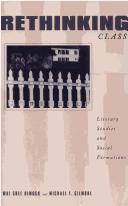
ISBN: 0231076010 Year: 1994 Publisher: New York (N.Y.) : Columbia university press,
Abstract | Keywords | Export | Availability | Bookmark
 Loading...
Loading...Choose an application
- Reference Manager
- EndNote
- RefWorks (Direct export to RefWorks)
Literature and society. --- Marxist criticism. --- Social classes in literature.
| Listing 1 - 10 of 12 | << page >> |
Sort by
|

 Search
Search Feedback
Feedback About UniCat
About UniCat  Help
Help News
News